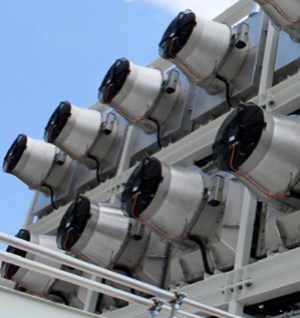UK Chancellor commits $24 billion to domestic carbon capture projects
(Bloomberg) — Britain’s pledge to pump money into carbon capture is ramping up a bet on the fledgling technology that’s fast becoming an international investment battleground.
Chancellor Jeremy Hunt on Wednesday officially committed as much as £20 billion ($24 billion) over the next two decades for local carbon capture and storage projects that pump emissions underground. CCS, which isn’t yet used at scale, is crucial to the UK’s net zero emissions target and will help expand green jobs.
The vow comes as competition in the race for clean technology heats up after President Joe Biden’s $370 billion climate bill, which raised tax credits for capturing carbon dioxide. That fueled worries that the UK will lose out on investment to the U.S. and put focus on how Britain can better attract green startups and spending.
“We are world leaders in renewable energy,” Hunt said in Parliament on Wednesday as he pledged to drive economic growth by unblocking business investment, including in green developments. The support for CCS projects will add up to 50,000 jobs and help the UK to meet its net-zero goals, he said.
The UK investment will go to projects that aim to store 20 million to 30 million tons of CO2 annually by 2030. That would benefit utilities like SSE Plc that own gas-fired plants where the technology will likely be applied. Gas fuels roughly 40% of Britain’s electricity now.
Low-carbon generation from stations run on biomass or natural gas with carbon capture, or hydrogen, could make up almost 10% of Britain’s power capacity by 2035, according to the Committee on Climate Change, a government body. The UK wants to decarbonize the grid by that year.
Carbon capture progress is picking up in Europe, where extensive subsidies already exist. European industrial companies injected CO2 below Denmark’s seabed for the first time last week. Ineos Energy was one of the firms involved, and Chairman Brian Gilvary said at the time that the US will “suck in investment” for CCS technology and that Europe needs to do more.
UK officials have raised concerns that Drax Group Plc may divert planned investment in carbon capture to the U.S. American senators are due to this week visit Drax’s Selby power station in northern England, where they’ll be shown plans for new bioenergy with CCS technology, people familiar with the matter have said.
Focus on domestic carbon capture projects
Many countries seem to be starting to strengthen their support for CCS policies to compete with the U.S. and keep industry from re-locating, said BloombergNEF analyst Brenna Casey. The UK’s pledge may be an example of that, she said.
“They could’ve been a bit more ambitious allocating more funding,” Casey said. “But the £20 billion is likely enough to at least keep the Drax investment domestic.”
Drax is currently waiting for approval for the Track-1 CCS program that will allow it to invest £2 billion to fit carbon capture on some of its biomass-fired units.
The company last year signed a memorandum of understanding for the world’s largest carbon-removals deal with Respira International, a participant in the voluntary carbon market. It gives Respira the option to buy 2 million tons of credits tied to carbon captured at U.S. plants Drax hasn’t yet built.
As well as preventing power plants releasing carbon, technologies like direct air capture tackle emissions by drawing carbon that’s already in the atmosphere. Storegga Ltd. and Carbon Engineering Ltd. are involved in the UK’s first large-scale deployment of these technologies in Scotland, where Shell Plc and Harbour Energy Plc also plan to capture emissions from gas terminals.
The challenge will be for the UK to not be left behind.
“The U.S. has really steamed ahead with carbon-removals funding at a time when the UK hasn’t done much at all,” said Ted Christie-Miller, head of carbon removal at ratings agency BeZero Carbon. “I’d really like some of this new funding to go to negative-emissions technology as well as CCS for power plants.”



